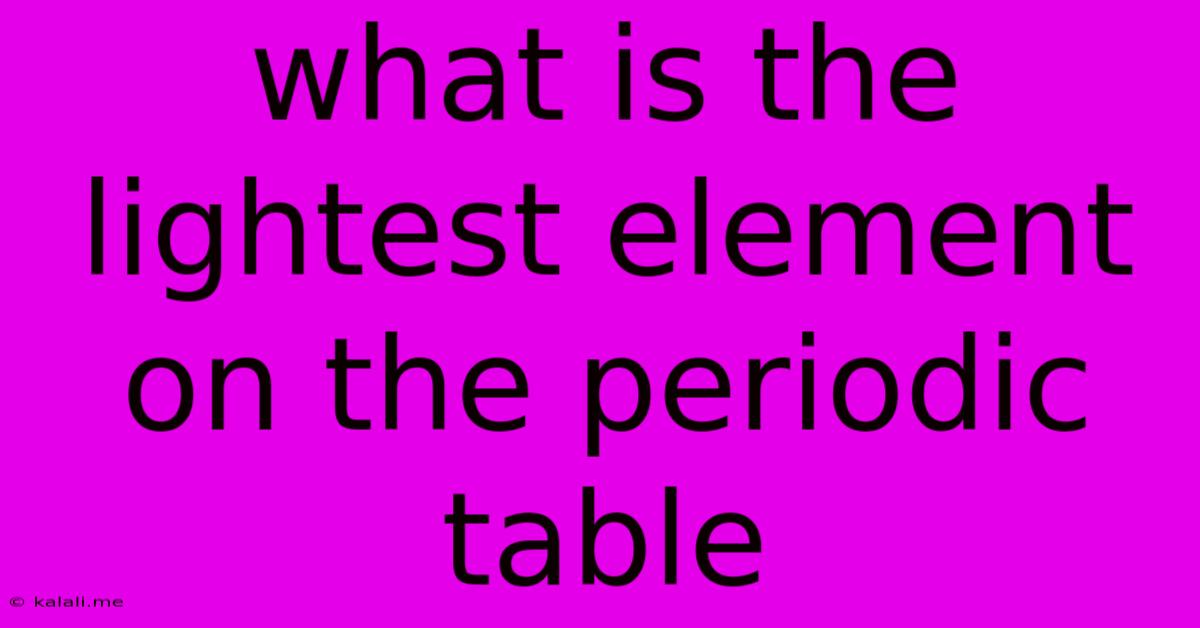What Is The Lightest Element On The Periodic Table
Kalali
Jun 13, 2025 · 3 min read

Table of Contents
What is the Lightest Element on the Periodic Table?
Hydrogen: The Lightest and Most Abundant Element in the Universe. This article delves into the properties, uses, and significance of hydrogen, the undisputed champion of lightness on the periodic table. Understanding its unique characteristics is crucial for appreciating its vast applications in various fields, from energy production to industrial processes.
Hydrogen, denoted by the symbol H and atomic number 1, holds the title of the lightest element. Its atomic weight is approximately 1.008 atomic mass units (amu), significantly lower than any other element. This incredibly low mass is a key factor in its unique behavior and widespread applications.
Understanding Atomic Weight and its Significance
Atomic weight, or atomic mass, refers to the average mass of an atom of an element, considering the different isotopes and their relative abundances. In hydrogen's case, its low atomic weight stems from its simple atomic structure—a single proton and a single electron. This simplicity contributes directly to its lightness and reactivity. Other elements, with their multiple protons, neutrons, and electrons, naturally possess higher atomic weights.
Properties of Hydrogen: Why it's so Light
Several properties contribute to hydrogen's status as the lightest element:
- Low Atomic Mass: As discussed, its single proton and electron give it the lowest atomic mass of all elements.
- High Reactivity: Hydrogen readily forms covalent bonds with other elements, particularly oxygen, forming water (H₂O). This high reactivity is a consequence of its single electron readily participating in chemical reactions.
- Gaseous State (at standard temperature and pressure): Under normal conditions, hydrogen exists as a diatomic gas (H₂), further emphasizing its lightness. Its low density allows it to rise and escape the Earth's atmosphere easily.
- Isotopes: Hydrogen has three isotopes: protium (¹H), deuterium (²H), and tritium (³H). These isotopes differ in the number of neutrons they contain, with protium being the most abundant and the lightest.
Applications of Hydrogen: A Versatile Element
Hydrogen's unique properties lead to a wide range of applications:
- Fuel: Hydrogen is gaining significant attention as a clean fuel source. When burned, it produces only water vapor, making it an environmentally friendly alternative to fossil fuels. However, challenges remain regarding efficient and safe hydrogen storage and transportation.
- Ammonia Production: The Haber-Bosch process uses hydrogen to synthesize ammonia (NH₃), a crucial component of fertilizers. This underscores hydrogen's importance in agriculture and food production.
- Metal Refining: Hydrogen is employed in various metallurgical processes, including the reduction of metal oxides to obtain pure metals.
- Chemical Synthesis: Hydrogen serves as a crucial reactant in countless chemical reactions, contributing to the synthesis of numerous compounds in various industries.
- Rocket Fuel: Liquid hydrogen, due to its high energy density, finds applications as a rocket propellant.
Conclusion: Hydrogen's Prominent Role
Hydrogen's position as the lightest element on the periodic table is not merely a scientific curiosity; it has profound implications for diverse sectors. Its low atomic weight, high reactivity, and versatile applications make it an indispensable element in modern society. While challenges remain in harnessing its full potential, particularly as a clean energy source, ongoing research and development continue to unlock new possibilities for this remarkable element. Its lightness is just one piece of the puzzle that makes hydrogen such a fascinating and important element in the universe.
Latest Posts
Latest Posts
-
Able To Be Drawn Into Wire
Jun 14, 2025
-
Which Of The Following Statements Is True Regarding
Jun 14, 2025
-
What Is The Least Common Multiple Of 20 And 40
Jun 14, 2025
-
Temple University Japan Campus Acceptance Rate
Jun 14, 2025
-
Which Of The Following Is Not An Aspect Of Globalization
Jun 14, 2025
Related Post
Thank you for visiting our website which covers about What Is The Lightest Element On The Periodic Table . We hope the information provided has been useful to you. Feel free to contact us if you have any questions or need further assistance. See you next time and don't miss to bookmark.